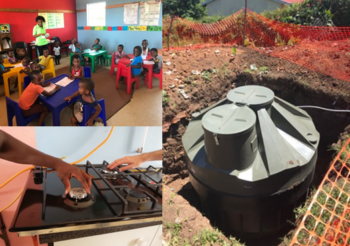Case study: Decentralised Micro-biodigester systems for rural South Africa
Decentralised Micro-biodigester systems for rural South Africa
This is the third of a case study compilation to explore lessons on material and energy valorisation of waste within the framework of IEA Bioenergy Task 36. The central technology in this case study is micro-biodigesters systems applied in rural areas in South Africa.).
South Africa’s rural areas have been historically characterised by persistent service delivery challenges, including lack of waste management services, poor access to reliable sanitation systems, inconsistent and unaffordable energy options. Although the viability of biogas systems as decentralised waste management, sanitation, and energy solutions for rural areas within the Global South has been well documented within contemporary literature, biogas interventions within South Africa have not been successful for a variety of reasons, namely, limited research and implementation, despite a readily abundant supply of suitable feedstock within rural contexts.
The purpose of this report is to contribute to the development of a best practice model for rural biogas provision in South Africa. It is contextualised within two interrelated, but distinct, rural bioenergy projects located in the Ndwedwe Local Municipality (NLM), within the iLembe District Municipality in the KwaZulu-Natal Province, funded by the South African National Energy Development Institute (SANEDI) and the National Lotteries Commission (NLC). These two projects encompassed repairs to 26 existing household digesters and design and implementation of new integrated biogas provision and sanitation systems at five Early Childhood Development Centres (ECDCs). Utilising a mixed-methodological approach, interventions were evaluated on their socio-economic, energy, and sanitation outcomes, and an optimisation plan was implemented to address identified shortcomings.
What was envisaged in the Ndwedwe biogas project were answers to the following:
- What is the typical low-income/rural household’s energy requirement?
- How much organic waste does the household produce?
- How much biogas could be produced?
- What reduction in deforestation does the change from the previously used fuel to biogas represent, expressed as the reduced area of deforestation and the increased carbon stock in trees?
- What is the value of the digested material as an organic fertiliser and the opportunities for valorisation thereof?
- What is the potential improvement in indoor air quality through reduced use of cook-stoves?
- Whether business opportunities could be derived for the further building, maintenance of the biogas digesters in the Ndwedwe area?
- What is the level of social acceptance of the beneficiaries to the technology and to progressively replacing LPG gas to biogas from the digesters for cooking?
While the income-level was a key consideration for the selection of households for the Ndwedwe biogas projects, other social factors, current, and in the future, were not catered for. The issue of abandonment and/or vandalization of the systems was not anticipated.
This report seeks to establish lessons learnt in the sustainability of operation and maintenance of the Ndwedwe biogas systems. The results of a detailed stakeholder engagement with municipal officials, industry, and beneficiaries, aimed at identifying barriers and drivers to implementation and rolling out of these systems, are reported hereafter.
Link to the publication below: Task 36 case study Biodigesters South Africa



